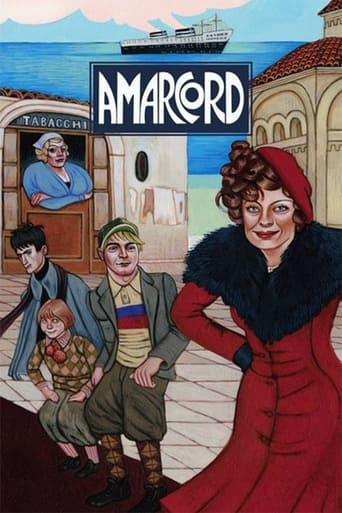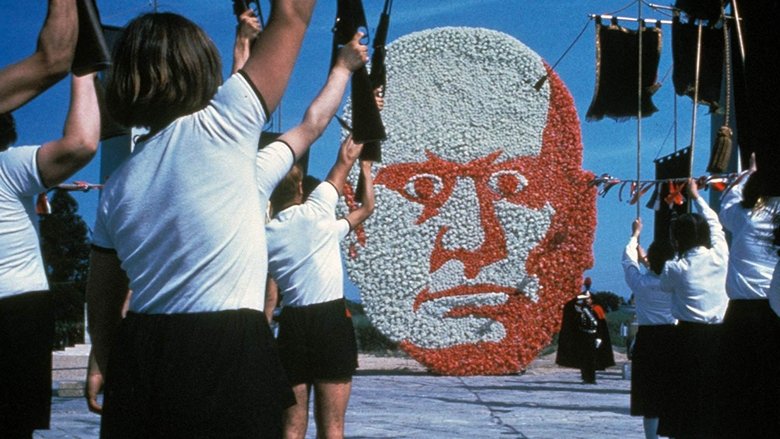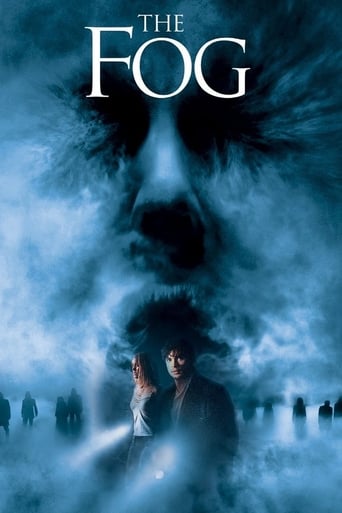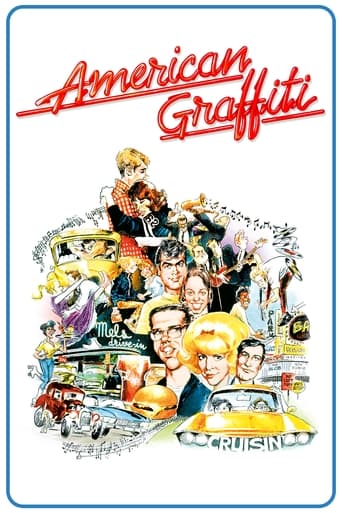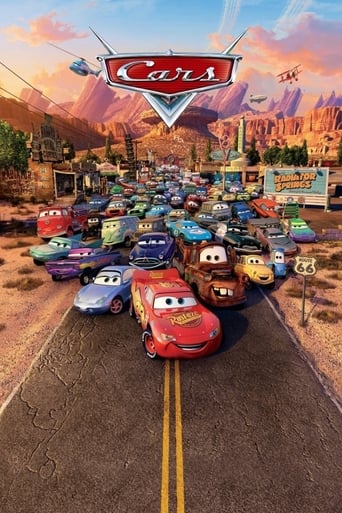Amarcord (1974)
In an Italian seaside town, young Titta gets into trouble with his friends and watches various local eccentrics as they engage in often absurd behavior. Frequently clashing with his stern father and defended by his doting mother, Titta witnesses the actions of a wide range of characters, from his extended family to Fascist loyalists to sensual women, with certain moments shifting into fantastical scenarios.
Watch Trailer
Free Trial Channels
Cast


Similar titles
Reviews
Too much of everything
A movie that not only functions as a solid scarefest but a razor-sharp satire.
All of these films share one commonality, that being a kind of emotional center that humanizes a cast of monsters.
Just intense enough to provide a much-needed diversion, just lightweight enough to make you forget about it soon after it’s over. It’s not exactly “good,” per se, but it does what it sets out to do in terms of putting us on edge, which makes it … successful?
Fellini gives us a series of memories, fantasies, and dreams in the vignettes which make up his semi-autobiographical film 'Amarcord' ('I Remember'). The message which comes through is loving, and about the gaiety of life, embracing its madcap characters and moments - moments which will someday live in our memories, hazy though they grow, as little diamonds of light. I loved the scenes satirizing the Fascists and the Catholic Church, and they're all the more powerful in this context, where they are reduced in significance, and just another zany thing Italians dealt with (or deal with) in life. The film doesn't strike any major philosophical chords, briefly coming close as men peer up into the heavens, but the lines uttered as a poem by a construction worker are powerful ("My grandfather made bricks / My father made bricks / I make bricks, too / but where's my house?"). I may be in the minority here, but the film didn't strike me as particularly beautiful, though it was a pleasure to see Magali Noël (Rififi, La Dolce Vita, and many others). It held my interest, but lacked a big punch, even in its sentimentality, though I was always pulling for it, and loved the many references to Hollywood actors from the 1930's. Unfortunately, there is not enough depth here to consider it a great film, and Fellini too often indulged in caricatures and juvenile humor. Net, a mixed bag.
It's 1930s Fascist Italy. The movie follows the odd quirky villagers of a seaside town. The fascist local government takes control of the eager villagers with comical ridiculousness. The village is obsessed with sex which the Catholic Church tries to suppress.There are some great memorable characters and memorable scenes. The one missing thing is a good compelling lead character. Titta needs to have more scenes as the lead and he needs to be played by a charismatic actor. The vignettes start to get scattered without that central cohesive glue. Some are more surreal than other. The harem in the hotel goes a bit over the top. Otherwise I really like the quirkiness.
I remember having seen Amacord in the late 1970s; and also that its last scene left a sad feeling in me, despite having had good fun watching the rest and more than a few laughs in some of the most outrageous scenes: the antics of teachers and students in the classroom, the hilarious shenanigans at the family table, the day out in the countryside, etc. If I had at the time to resume the whole movie in one word I would have said: Nostalgia. What perhaps gives a good hint of how the world has changed, or maybe me, is that after this present day viewing I would have said two different words: Sadness, Melancholy. Amacord is such a melancholic film, it made me feel sorry for Fellini, for the things he had to endure during those early years of his life. I didn't notice at the time how sad is to have to grow up in a political system that doesn't allow the smallest form of dissent and which, even worse, has managed to entirely wrap up the lives of everyone in society and made of them contented, brainless, drones. How sad to have had, in that crucially formative period of our life nothing but unfunny clowns as our role models: the patriarch who nobody takes seriously and who in utter frustration tries to commit suicide tearing apart his own jaws; a poor sap whose isolated act of rebellion backfires and ends up in a literal stinko. The priest more preoccupied with church flower arrangements than with the confession of his young faithful. The parasitic uncle who pays his brother in law for providing him with free room and board by denouncing him to the fascist police. The gramps who rather than to dispense wise, time tested, advice to his grandchildren prefer to spend his time grabbing the maid, farting and reminiscing about "the old in and out", as Alex Lelarge would put it. A gallery of characters that, if you look behind the antics, the laugh, are throughly pathetic. Growing amongst them must have been quite an ordeal for poor young Federico.Of course some will have a different view on things, taking what Fellini himself postulated about the artist and reality "What is reality, who cares about reality?" He snaps back, answering to his interviewer, when confronted with the idea that any artwork is the fruit of the artist's take on reality. Not so, he says. The artist's work is not the reflection of reality in his mind, soul, but an entirely new construct by him. The artist creates his own reality says Fellini, and because of that he, Fellini, defines himself as a lier, but a honest one. So, we are not here to see his reminiscences of his younger years but to see the construct of his own imagination, using as basic bricks for it his own experiences, or those of others. Some of what we see in Amacord really happened, in the same way or not, and some of it is just his imagination. But we are not here to decode fiction from reality--must be our conclusion—but to watch what he has prepared for us. Sorry but that doesn't change the bare historical facts. Titta, Fellini's best friend, speaks of his complete indifference to the then prevailing political system and, given the faithful reproduction of the social conditions at the time in the film, we can only assume that what lay behind such indifference was nothing but a complete impotence and powerlessness face to the reigning situation as Titta's father, in the movie, shows us well where any demonstration of protest or revolt could have led the protester.One point well made by the DVD commentators concerns the subservient role played by women in Fellini's movies. Real communication, intimacy, between the sexes is practically absent, at least in this one, and women usually appear there to fulfill men's fantasies—to offer them their over-sized backsides and breasts for appreciation, for ex.--to clean after them or to take whatever blame is for the taking. Examples on this abound and I mention it because it's something I noticed also. The film begins, in fact, with the public burning of the "winter witch"(!)--with no Spring Fairy in sight. Then a good deal of movie time is spent showing males of all ages salivating at the sight of female body parts--which makes for a rather eerie analogy with a butcher's view of things--and ends up with the saddest vignette of all: Gradisca, the only truly liberated woman in town, marrying...a Mussolini carabiniere. A bird free as the wind willingly getting into a steel cage, everything coming into order... But anyway, this is a masterly made piece of cinematography. The color compositions are truly breathtaking, specially during the surreal late afternoon scene where the mad uncle is ordered down the tree by a midget nun. Also kudos for the night passage of the Rex and the foggy morning. Other scenes that deserve applause are the school kids dancing to the film's score outside the Grand Hotel, the bum playing the flute to the harem, the Mussolini parade and the recurrent guy in the motorcycle—I wish Gradisca had married him instead. The pacing is sustained and the camera work appropriate, without being what draws the most attention--that's ostensibly the colors. The acting, well, these people don't even seem to be acting, they are just being themselves, as in any typical Fellini. As for plot, there's no one here, just a composition of miscellaneous anecdotes intended to create a mood in the viewer, presumably of nostalgia...or sadness maybe. In all, a great Fellini, if not the most joyful or the deepest. 7.5/10.
Amarcord, Italian for "I Remember," is a colorful and artistic film from famed Italian director Federico Fellini. It tells the story of a small Italian coastal town under a fascist regime before World War II. The film paints a grand imaginative portrait of this town as recalled by its spry director who possesses a keen knack for creative and spirited storytelling. We grow to love the characters in the film and we watch their larger-than-life stories unfold before our eyes in a beautiful and enticing way. This film makes its own rules and paints itself up as an incredibly spirited tale of joy, love, and even bittersweet remorse for a town that only could have existed the way it did in the time period it did.It isn't difficult to see the personal level of this film that Fellini includes. It is apparent how much of the story was taken from his own childhood and then injected with a wistful and almost make-believe quality of storytelling. The town in the film is based on Rimini, the town where Fellini grew up, so it is a given that this is a personal film, but you don't even have to know that to see the personal connection coursing through this film's veins. Fellini has created a nostalgic story for himself that others can also enjoy to great extents. Amarcord isn't self indulgent and it doesn't lose track of its heart and soul which makes it such a pleasurable experience.Fellini takes some liberties with the narrative style of this film as it is told in a very free-form way. It is almost a collection of short stories thrown together in a playful and creative way. The town and its strong heritage, affecting each enjoyable character, is the thread which ties the scattered pieces of the narrative together and keeps it from being uncohesive or confusing. Amarcord is the study of a town, as well as the study of people and family. It weaves all of its stories and characters in and out of each other, never losing its loving and colorful mood. The film boasts a lot of fun style throughout with plenty of humor thrown in. The film is very funny at times, but it displays a smarter and more sophisticated humor without being pompous or self important. The film's humor is an excellent display of sarcasm, irony, and cleverness all rolled into a bundle of entertainment.For everything Amarcord does, it does right and it does well. It is simplistic in its motives and care free in its narrative. It isn't anything complex or serious. It only seeks to entertain, while also provide a glorious, imaginative, and often times nostalgic look at the simpler times of life and what joys they bring us. While Amarcord isn't a film I would watch over and over again, there is absolutely no denying that it is an excellent film well worth the watch.

